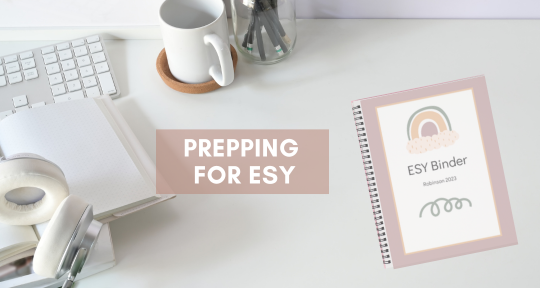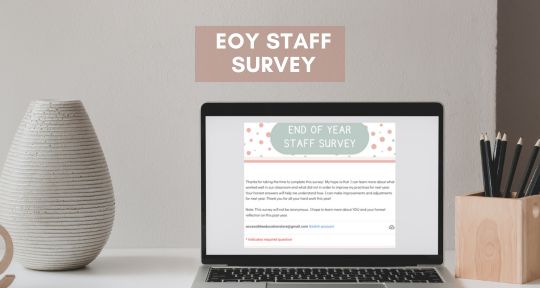As a teacher, there is no worse feeling than going into an IEP meeting and being blindsided by a parent concern.
But- as a parent, how would you feel walking into an IEP meeting with a bunch of professionals who all work together, speak the “sped lingo”, talking about your child as if you aren’t the expert on your child, and having a 20 page convoluted document put in front of you?
As teachers, we NEED to be reminded of that whenever we have a meeting coming up. No matter if the student has 1 goal or 8 goals, the IEP team needs to look at the whole child in the most accurate way possible. That is not going to happen if you don’t get family input! Yes, you spend 40 hours a week with students in your classroom. Yes, you might have students with you for 4-5 years. But none of that holds a candle to the information that a family has on THEIR child that they have parented/cared for every day for years. If there was a member of the team that was an expert on that child (all of this is assuming you have an IEP meeting for students who aren’t old enough to attend meetings themselves), wouldn’t you want every ounce of information you could get from that expert?!
You might be thinking- but Megan, it is illegal to have pre-conferences before an IEP meeting. And you would be right! But here is a loophole that will help you get around this problem.
Once you realize that the family members on your IEP teams are your most valuable resource (I know… duh!) you need a tool to collect information from them prior to the meeting for a couple of reasons. A family IEP survey is one way to collect this information in a quick and simple way to help incorporate your families’ input into the meeting. Here are the reasons you should enact this:
1. Establishing a relationship. Wouldn’t you love to know your child’s teacher cares about your input? Wouldn’t that make all the difference when going into a conference or a hard conversation? This is not a substitution for the work you need to put in throughout the entire school year to develop relationships with the families of your students, but it is a great first step if a student is new or if you haven’t made this as much of a priority in the past.
2. Meetings are intimidating. As I stated earlier, there is a serious intimidation factor for families walking into IEP meetings. Many families walk away from those meetings feeling like they didn’t get all of their thoughts out, or felt like they weren’t listened to. Not only does the IEP survey create a paper trail for parent concerns, but it allows them to do research, consult with other parents, or touch base with an advocate before the meeting so they come prepared to discuss everyone on their minds.
3. Not everyone can attend. If your district only holds meetings during the work day like my district does, there are going to be many members of the household who aren’t going to be able to attend IEP meetings. We would be remiss to mistake that as not being interested or not caring- parents and caregivers have lives, jobs, and often other children to watch. A survey that is sent home is a simple way for those family members to give input into the IEP.
Your students have a context and history outside of your classroom that cannot and should not be ignored. This might be a hard thing to do as a teacher, especially if there is a difficult relationship between the school and the family, but as teachers who have promised to do our best by our students, hearing hard truths about our practice is important and necessary. You will never grow as an educator if you never receive feedback- that is why we have evaluation systems in public schools. You will also never fully know or serve the whole child if you never receive feedback from families.
Here is a link to the IEP Family Survey I have created and updated throughout the years- I’d love to hear if you use it! Also- If you’re a parent who wishes your child’s teacher did this- send it in anyway! There is nothing prohibiting you from reaching out to your child’s teacher or IEP team with this information, even if they didn’t ask for it.
A quick note of caution- I am not advocating for blindly following every suggestion a parent makes. Everyone on the IEP team is coming to that meeting with a specific expertise, training, and background knowledge that makes them uniquely qualified to teach/provide a particular service. You have a legal obligation as a teacher to enact evidenced based interventions and services. This tool is simple to correct the common phenomenon at IEP meetings where the school-based members of the team railroad the parents because they are the “experts.” You might be an expert in language therapy or teaching reading or AAC, but the family will always be the expert on the child (when the child isn’t able to be present). If there is a disagreement between the family and the rest of the team about implementation or the way a goal is written, the best approach is to have an open and honest discussion about where each party is coming from and rooting the decision in evidence based best practice. When that can’t happen, you should immediately let your supervisor know so that the district can take next steps with the family to either have further meetings or move towards mediation/due process.


